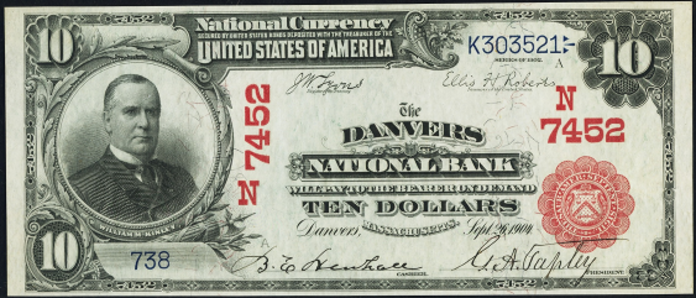Ten Dollar Notes › Nationals › 1902 Ten Dollar National Bank Notes › California Charters › 1902 $10 San Fernando California San Fernando National Bank
Get Value Now
| Item | Info |
|---|---|
| Series | 1902 |
| Charter | #10273 San Fernando National Bank of San Fernando, California |
| Year Chartered | 1912, 186 Banks Chartered |
| City Info | San Fernando is a city in the San Fernando Valley, in the northwestern region of Los Angeles County, California. It is surrounded by the City of Los Angeles. The city was named for the nearby Mission San Fernando Rey de España, and was part of the Mexican land grant of Rancho Ex-Mission San Fernando. In 1874 Charles Maclay, San Fernando founder, bought 56,000 acres of the Rancho. In 1882, cousins George K. Porter and Benjamin F. Porter of future Porter Ranch each received one-third of the total land. In 1885, Maclay founded the Maclay School of Theology, a Methodist seminary in his newly founded town of San Fernando. After his death it became an affiliate and moved to the campus of the University of Southern California and then the Claremont School of Theology. Source: Wikipedia |
| Similar Cities | If your note doesn't match try: 1. San Fernando, California - First National Bank |
| Seal Varieties | Red, Blue |
| See Also | If your note doesn't match try: 1. 1907 $10 Gold Certificate 2. 1901 $10 Legal Tender 3. 1908 $10 Silver Certificates |
| Other Info | 1. Value depends on notes known for charter, condition and market demand. |
| Neat Fact | Portrait of President William McKinley. |
No Obligations Offers and Appraisals
Please submit a good photo or scan. It will be identified and evaluated. Understand there may be subtle differences between the image you see above and your note. Signatures, design, markings and note condition will determine the offer price. Notes in Uncirculated or better condition receive the best offers.
Appraisals can be estimated for wholesale and retail prices. Wholesale is what dealers typically pay. Retail is what a collector might pay. Retail is slightly higher in most cases.
Please visit this page for USA Paper Money Reference. Do not treat this page as a reference guide, it is for appraisal and acquisition purposes only.
